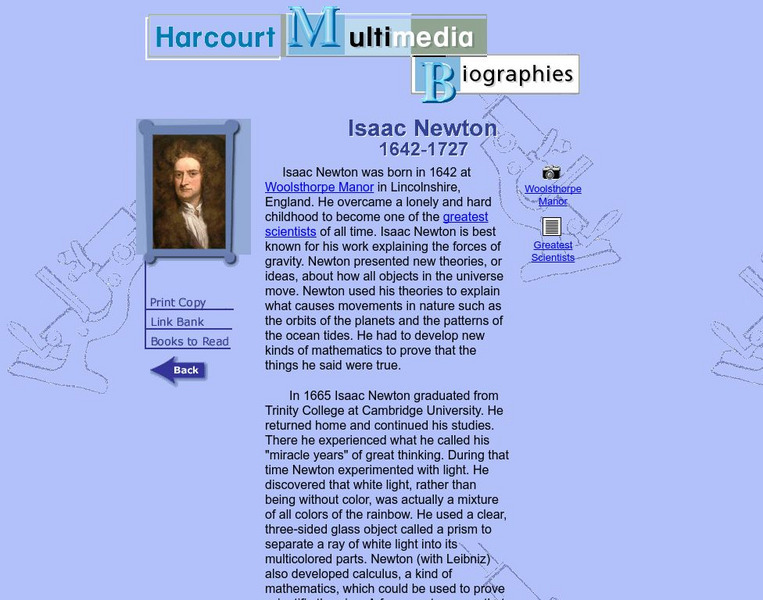Hi, what do you want to do?
Science Struck
Science Struck: A Comprehensive List of All the Physics Formulas
Provides a long list of physics formulas for easy reference.
TeachEngineering
Teach Engineering: Sliding Textbooks
In this culminating activity of the unit which highlights how forces play a role in engineering design and material choices, students explore and apply their knowledge of forces, friction, acceleration, and gravity in a two-part experiment.
Yale University
Open Yale Courses: Fundamentals of Physics
Intended for students with a strong math and science background, a course introducing physics concepts of Newtonian mechanics, special relativity, gravitation, thermodynamics, and waves. Twenty-four class sessions in video format are...
Sophia Learning
Sophia: Newton's First Law: Lesson 3
This lesson introduces Newton's First Law, that inertia causes objects at rest to remain at rest, and objects in motion to remain in motion. It is 3 of 3 in the series titled "Newton's First Law."
Sophia Learning
Sophia: Newton's Third Law: Lesson 2
This lesson will show that when a force is exerted on an object, an equal and opposite force is produced, as stated in Newton's Third Law. It is 2 of 3 in the series titled "Newton's Third Law."
Physics Classroom
The Physics Classroom: Circular and Satellite Motion: Universal Gravitation Law
Through interactive illustrations and practice problems, students study Newton's Universal Law of Gravitation.
CK-12 Foundation
Ck 12: Physics Simulation: Pirate Ship
[Free Registration/Login Required] Learn about Newton's 3rd Law, and how the concept of the 'force pair' allows us to understand interactions between objects using this interactive simulation. A PDF worksheet and a video tutorial are...
TED Talks
Ted: Ted Ed: What if Everyone Jumped at the Same Time?
If every action has an equal and opposite reaction, what kind of physical action would it take for the earth to notice us? Check out Vsauce's video on what would happen if everyone on Earth got together and jumped. [7:13]
Physics Aviary
Physics Aviary: Practice Problems: Car on a Turn Problem
Students must determine the force of friction on a car on a turn and the maximum speed the car could navigate a turn.
Physics Classroom
The Physics Classroom: Vibrational Motion
In this article the concept of vibrational motion and its relationship to waves is introduced.
CK-12 Foundation
Ck 12: Physical Science: Types of Friction
[Free Registration/Login may be required to access all resource tools.] The four types of friction and how they act on objects.
Upper Canada District School Board
Tom Stretton's Chemistry Pages: Dynamics Bodies in Motion
Through an online slide-show format, learn about the physics of motion, including Newton's laws of motion.
University of Colorado
University of Colorado: Ph Et Interactive Simulations: Forces and Motion: Basics
See how forces affect various items that are pushed or pulled.
Texas Education Agency
Texas Gateway: Gravity Understanding
In this learning module students can get a better understanding of how gravity affects our solar system.
CK-12 Foundation
Ck 12 Exploration Series: Simulations: Physics: Loop the Loop
[Free Registration/Login Required] Learn about the centripetal motion in the context of a roller coaster going through a loop-the-loop and over a hill.
CK-12 Foundation
Ck 12 Exploration Series: Simulations: Physics: Tether Ball
[Free Registration/Login Required] Learn about centripetal motion in the context of the game of tether-ball.
Physics Classroom
The Physics Classroom: Finding Individual Forces
Explore the world of finding individual forces. "The process of determining the value of the individual forces acting upon an object involve [sic] an application of Newton's Second law and an application of the meaning of the net force."
TeachEngineering
Teach Engineering: Destination Outer Space
Students acquire a basic understanding of the science and engineering of space travel as well as a brief history of space exploration. They learn about the scientists and engineers who made space travel possible and briefly examine some...
TeachEngineering
Teach Engineering: Pop Rockets
Students design and build a paper rocket around a film canister, which is used as the engine. An antacid tablet and water are put into the canister, react to form carbon dioxide gas, and act as the pop rocket's propellant. With the lid...
Houghton Mifflin Harcourt
Harcourt: Biographies: Isaac Newton
A brief biography on scientist Isaac Newton, highlighting his discoveries and the book he published in 1687, "Principia", which was on his theories of gravity and laws of motion.
Khan Academy
Khan Academy: Isaac Newton
A biography of the scientist that developed the theory of gravity and founded the three basic laws of motion, Isaac Newton.
Soft Schools
Soft Schools: Physics Quizzes: Force, Mass Acceleration
Assess your understanding of force, mass and acceleration and the relationship amongst the three with this interactive multiple choice quiz. Immediate feedback is offered.
Columbia University
The Climate System: Atmospheric Forces, Balances, and Weather Systems
The large scale horizontal flow of air in the atmosphere is driven by the imbalance of net radiation over the globe. This resource introduces us to the physical laws governing the horizontal motion of air. It also describes types of...
TeachEngineering
Teach Engineering: Mechanics Mania
Through ten lessons and numerous activities, students explore the natural universal rules engineers and physicists use to understand how things move and stay still. Together, these rules are called "mechanics." The study of mechanics is...




















